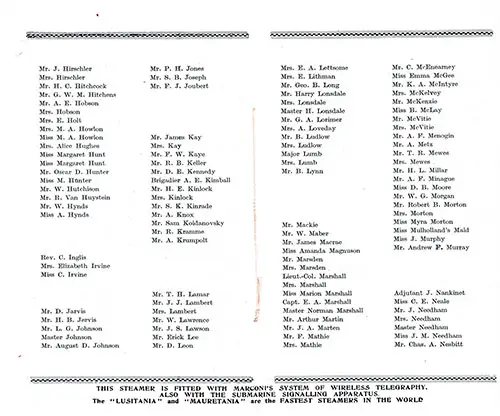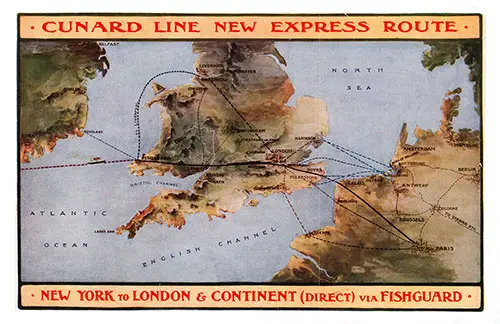RMS Aquitania Passenger List – 11 July 1914: Military Officers, Missionaries & Families Crossing Before WWI
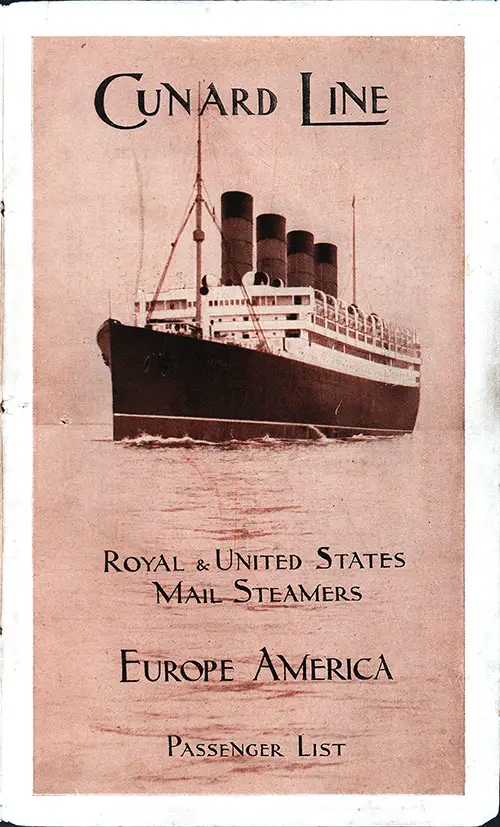
Front Cover, RMS Aquitania Second Cabin Passenger List, Departing Saturday, 11 July 1914 from Liverpool to New York, Commanded by Captain W. T. Turner, RNR. | GGA Image ID # 13b5349dda
🚢 Review & Summary – RMS Aquitania Passenger List (11 July 1914)
⚓ The Ship & The Voyage
The RMS Aquitania, launched in 1913 by the Cunard Line, was one of the largest and most luxurious ocean liners of her age. Nicknamed the “Ship Beautiful,” she was famed for her grand interiors, four iconic funnels, and service connecting Britain to the United States.
- Operator: Cunard Line
- Route: Liverpool → New York (with Fishguard as the express route link to London/Paris)
- Date of Voyage: Saturday, 11 July 1914 – just weeks before the outbreak of World War I
- Commander: Captain William Thomas Turner, R.N.R. – later remembered as the captain of Lusitania when it was torpedoed in 1915. His presence here gives this document extraordinary historic significance.
This sailing occurred at the edge of history—Europe was on the brink of war, and many passengers may have been making transatlantic moves or visits before global tensions disrupted civilian travel.
Senior Officers and Staff
- Commander: Captain W. T. Turner, R.N.R.
- Staff Captain: R. V. Peel, R.D., R.N.R.
- Chief Engineer: A. Bryce
- Assistant Chief Engineer: G. Patterson
- Chief Officer: S. Gronow
- Purser: J. A. McCubbin
- Assistant Purser: P. Draper
- Surgeon: Jas. Pointon
- Assistant Surgeon: J. P. Litt
- Chief Steward: Wm. H. Allison
⚓ Command and Crew Notes
Captain William Thomas Turner, R.N.R.
Later famous as the captain of RMS Lusitania when she was torpedoed in 1915.
His presence as Aquitania’s commander in 1914 is historically significant, especially given his notoriety in maritime history.
Collectors and historians prize documents tied to Turner because of his role in one of the most infamous ocean tragedies.
Staff Captain R. V. Peel, R.D., R.N.R.
The Staff Captain (essentially the XO) was second in command and often responsible for discipline, safety drills, and navigation assistance.
Peel’s repeated presence on other Cunard liners indicates he was a career R.N.R. officer — these names can be cross-referenced in naval lists, adding value.
Other Senior Officers Highlights
- Chief Engineer A. Bryce – Head of engine department, critical to the smooth running of a four-funnel liner.
- Purser J. A. McCubbin – Responsible for passenger services, currency exchange, and official records.
Second Cabin Passengers
List of Passengers, Part 1 (Mr. Adam-Mrs. Bell)
- Mr. Adam
- Mrs. Adam
- Master Adam
- Col. John Addie (s.a.)
- Mrs. S. Adler
- Master M. Adler
- Master S. Adler
- Miss M. Allen
- Miss J. Allen
- Mr. Jens J. Anderson
- Mr. Louis Anderson
- Mrs. Anderson
- Mr. P. Appleton
- Mrs. A. Arnstein
- Master Arnstein
- Mr. J. W. Barber
- Mr. A. S. Barham
- Mr. John Baxter
- Miss L. Bean
- Mr. H. A. Bell
- Mrs. Bell
List of Passengers, Part 2 (Mr. S. . Bennetts-Mrs. Dickie)
- Mr. S. H. Bennetts
- Mr. J. Bentley
- Mr. S. Bentley
- Mr. W. H. Bevan
- Mrs. M. J. Bevan
- Mrs. Q. D. Bevan
- Mr. A. Biddle
- Miss A. Birchall
- Mr. J. Broidy
- Mrs. J. Brooks
- Mr. W. Brown
- Miss H. A. Brown
- Mr. C. A. Buckner
- Mr. A. A. Bullen
- Mr. A. R. Buttock
- Mr. R. Burns
- Miss M. Burns
- Ensign Lucy Bushnell
- Mr. Butler
- Mrs. E. Butterly
- Mr. George Calton
- Mr. D. Campbell
- Mr. Heyworth Campbell
- Mrs. Campbell
- Mr. C. A. Cardwell
- Mr. Carlson
- Mrs. Carlson
- Mr. H. L. Carman
- Mr. A. B. Carrirk
- Mr. M. Carroll
- Mr. D. S. Chisholm
- Mr. T. Christiansen
- Mr. Alf. Christoffersen
- Miss H. C. Clarke
- Mr. Walter Clarke
- Mr. Lawrence Clawson
- Miss A. M. Clowes
- Mr. T. Collett
- Mrs. L. Collett
- Rev. M. A. Condon
- Mrs. J. Cook
- Miss. Cooke and Infant
- Miss M. Cooney
- Mr. G. W. H. Corbett
- Miss Blanche B. Cox
- Mr. E. E. Craddock
- Rev. D. Cramman
- Mr. F. A. Craven
- Mrs. Craven
- Mr. W. Crosland
- Mrs. Crosland
- Mr. C. A. Crossley
- Mr. C. W. Darker
- Mrs. Darker
- Miss W. Davis
- Mr. B. Delbridge
- Dr. John Dennett
- Mr. M. Dickie
- Mrs. Dickie
List of Passengers, Part 3 (Mr. Harry S. Donaghy-Mr. A. E. Higgins)
- Mr. Harry S. Donaghy
- Mrs. Emma Duncan
- Mr. George William Duncan
- Miss Winifred Eadsforth
- Mr. Adolf Eklund
- Mr. Hugh Elder
- Mr. J. E. Ellis
- Mr. P. E. Erhorn
- Mrs. Erhorn
- Miss Kochel Essenborg
- Mr. Richard T. Evans
- Mrs. Evans
- Mrs. E. C. C. Fenn
- Mr. Herman Filsen
- Miss D. Fisher
- Mr. James Forbres
- Capt. W. A. Fordyce
- Mrs. Fordyce and Infant
- Capt. Foster
- Mr. A. Fothergill
- Mr. Samuel Freedman
- Mrs. Eliz. Gaskell
- Mr. C. Glikys
- Mrs. E. Glikys
- Mr. Abraham Goldstein
- Mrs. Goldstein
- Mr. Lewis Goldstein
- Mr. H. S. Gooch
- Mis. Gooch
- Mr. C. Gould
- Mrs. Gould
- Miss Ida N. Gould
- Miss E. Gravelle
- Mrs. Green
- Mrs. Margaret Green
- Mr. H. Griffiths
- Mr. Haagen
- Mrs. A. K. Hall
- Miss M. K. Hall
- Miss Emily Hall
- Mr. J. D. Halton
- Miss B. Hamilton
- Miss Hilda Hanby
- Rev. H. Hansen
- Miss S. Hansen
- Miss Lillian Hartley
- Mr. P. Hayday
- Mr. John Hayes
- Mrs. Hayes
- Miss Emilia Hearth
- Mr. H. Hermann
- Mr. R. B. Hesketh
- Miss E. Hesse
- Mr. A. E. Higgins
List of Passengers, Parts 4 and 5 (Mr. J. Hirschler-Mr. Chas. A. Nesbitt)
- Mr. J. Hirschler
- Mrs. Hirschler
- Mr. H. C. Hitchcock
- Mr. G. W. M. Hitchens
- Mr. A. E. Hobson
- Mrs. Hobson
- Mis. E. Holt
- Mrs. M. A. Howlon
- Miss M. A. Howlon
- Mrs. Alice Hughes
- Miss Margaret Hunt
- Miss Margaret Hunt [sic]
- Mr. Oscar D. Hunter
- Miss M. Hunter
- Mr. W. Hutchison
- Mr. It. Van Huystein
- Mr. W. Hynds
- Miss A. Hynds
- Rev. O. Inglis
- Mrs. Elizabeth Irvine
- Miss C. Irvine
- Mr. D. Jarvis
- Mr. H. B. Jervis
- Mr. L. G. Johnson
- Master Johnson
- Mr. August D. Johnson
- Mr. P. H. Jones
- Mr. S. B. Joseph
- Mr. F. J. Joubert
- Mr. James Kay
- Mrs. Kay
- Mr. K. W. Kaye
- Mr. R. B. Keller
- Mr. D. E. Kennedy
- Brigadier A. E. Kimball
- Mr. H. E. Kinlock
- Mrs. Kinloek
- Mr. S. K. Kinrade
- Mr. A. Knox
- Mr. Sain Koidanovsky
- Mr. K. Kramnic
- Mr. A. Krampolt
- Mr. T. H. Lamar
- Mr. T. J. Lambert
- Mrs. Lambert
- Mr. W. Lawrence
- Mr. J. S. Lawson
- Mr. Erick Lee
- Mr. D. Leon
- Mrs. K. A. Lettsome
- Mrs. E. Lithman
- Mr. George B. Long
- Mr. Harry Lonsdale
- Mrs. Lonsdale
- Master H. Lonsdale
- Mr. G. A. Lorimer
- Mrs. A. Loveday
- Mr. B. Ludlow
- Mrs. Ludlow
- Major Lumb
- Mrs. Lumb
- Mr. H. Lynn
- Mr. Mackie
- Mr. W. Maber
- Mr. James Macrae
- Miss Amanda Magnuson
- Mr. Marsden
- Mrs. Marsden
- Lieut.-Col. Marshall
- Mrs. Marshall
- Miss Marion Marshall
- Capt. E. A. Marshall
- Master Norman Marshall
- Mr. Arthur Martin
- Mr. J. A. Marten
- Mr. F. Mathie
- Mrs. Mathie
- Mr. C. McEnearney
- Miss Emma McGee
- Mr. K. A. McIntyre
- Mrs. McKelvey
- Mr. McKenzie
- Miss H. McLay
- Mr. McVitie
- Mrs. McVitie
- Mr. A. F. Menogin
- Mr. A. Metz
- Mr. T. H. Mewes
- Mrs. Mewes
- Mr. H. L. Millar
- Mr. A. F. Minague
- Miss D. B. Moore
- Mr. W. G. Morgan
- Mr. Robert B. Morton
- Mrs. Morton
- Miss Myra Morton
- Miss Mulholland's Maid
- Miss I. Murphy
- Mr. Andrew P. Murray
- Adjutant J. Nonkinet
- Miss C. E. Nealo
- Mr. J. Needham
- Mrs. Needham
- Master Needham
- Miss J. M. Needham
- Mr. Chas. A. Nesbitt
List of Passengers, Part 6 (Mr. W. North-Mr. W. K. Sheriff)
- Mr. W. North
- Mrs. North
- Miss Minnie B. Norton
- Mr. George Oliver
- Mr. Edward Olsson
- Mr. G. Patterson
- Mr. Philip G. Peabody
- Miss N. Pearson
- Miss A. M. Pearson
- Adjutant Lois Peers
- Mr. J. D. Percy
- Mr. R. O. Philipson
- Mr. Daniel Pinching
- Mrs. Pinching
- Miss Pinching
- Mr. R. H. Playfair
- Miss L. M. Poore
- Mr. Alfred A. Pourn
- Mr. Pratt
- Mister Pratt [sic]
- Mr. R. G. Proudlock
- Madame Psarsky
- Mr. R. Purvis
- Mr. William Ramsay
- Mr. James Ramsay
- Miss L. S. Rami
- Mrs. M. Randall
- Mrs. K. J. Ranson
- Mr. James Reese
- Mr. Thomas Rennie
- Miss K. Rennie
- Mr. Rewe
- Master Rewe
- Mr. P. Rinn
- Mr. William Roberts
- Mrs. Roberts
- Mr. O. R. Roberts
- Miss Royce
- Miss D. E. Roys
- Mr. W. J. Russell
- Miss Russell
- Mr. T. H. Sandall
- Adjutant H. A. Sanford
- Mr. G. H. Saywell
- Mr. Jolin Schofield
- Rev. W. N. Schulte
- Mis. Schulte
- Mr. Scott
- Mr. Jos. S. Scott
- Mr. Hans P. Sethro
- Mr. R. Sharpies
- Mr. H. F. Shaw
- Mr. N. J. Sheridan
- Mr. W. K. Sheriff
List of Passengers, Part 7 (Mr. Silcock-Mrs. Sarah Winkel)
- Mr. Silcock
- Mr. Howard Silcock
- Mr. E. T. Sills
- Mr. John Simpson
- Mr. John Simpson
- Mr. Thomas E. Smith
- Mrs. Amelia Smith
- Mrs. A. Smith
- Mr. Thomas Spargo
- Mr. Robert Spearman
- Mr. Hugo Spilzer
- Mr. W. S. G. Sprake
- Mr. W. Steadman
- Mr. H. Steffen
- Mr. Chas. G. Strand
- Mrs. Strand
- Miss M. Strand
- Mr. Michael Stephens
- Mr. Jacob Swartz
- Mr. William K. Tait
- Mrs. M. B. Taylor
- Mr. John Taylor
- Mr. J. Torrany
- Mrs. Torrany
- Miss D. Terrany
- Mr. C. W. Thompson
- Miss E. R. Tooth
- Capt. E. Turner
- Mrs. E. F. W. Van Timmeren
- Mr. J. Vila
- Mr. E. N. Vose
- Mr. George P. Wagner
- Mrs. M. L. Wagner
- Mr. T. V. Wallace
- Miss Charlotte Wallace
- Miss Hilda Wallenius
- Mr. K. .J. Warronder
- Mr. G. A. Watson
- Mrs. Watson
- Miss M. Watson
- Mr. E. J. Wheeler
- Miss Lucy Wheeler
- Mr. Richard White
- Mrs. White
- Master W. White
- Miss Emma White
- Mr. O. White
- Mr. Isaac White
- Mr. H. D. Wilkie
- Mrs. K. Williams
- Mr. Wm. Wilson
- Mrs. S. Wilson
- Mrs. Sarah Winkel
List of Passengers, Part 8 (Brigadier J. R. Wiseman-Master Yudlevitz)
- Brigadier J. R. Wiseman
- Mr. Olans C. Wold
- Mrs. Wold
- Master Robert M. Wold
- Mr. T. S. Wood
- Mr. Harry Woods
- Mr. John L. Woolson
- Mrs. Woolson
- Miss Jane Ellen Worswick
- Mr. Wotton
- Mr. Wyon
- Mr. Joseph Yudlevitz
- Mrs. Yudlevitz
- Master Yudlevitz
👤 Notable Second Cabin Passengers
This list of more than 500 names represents a diverse cross-section of middle-class professionals, clergy, military officers, and families. Several stand out:
🎖 Military Figures
Col. John Addie – British Army officer; such senior officers frequently traveled for postings or recuperation.
Capt. W. A. Fordyce & Capt. Foster – Retired or traveling officers, a reminder of Britain’s far-flung imperial commitments.
Brigadier A. E. Kimball – A high-ranking officer; his presence highlights the Aquitania as a carrier of senior military figures.
Lieut.-Col. Marshall & Capt. E. A. Marshall – A possible family group of officers; military families often traveled together when reassigned overseas.
Major Lumb – Another senior officer, underscoring the ship’s importance for official and personal military transport.
Brigadier J. R. Wiseman – A second brigadier on this voyage, unusually high-ranking for second-cabin class.
✝ Religious Figures
Rev. M. A. Condon – Clergy were often traveling to colonial postings, lectures, or parish work.
Rev. D. Cramman – Another clerical presence; documents like this help genealogists trace ministerial careers.
Adjutant Lois Peers, Adjutant J. Nonkinet, and Adjutant H. A. Sanford – “Adjutant” titles strongly suggest Salvation Army missionaries, showing how religious organizations used Cunard liners to send personnel abroad.
Rev. W. N. Schulte – Another Protestant clergyman in transit, adding to the voyage’s religious diversity.
Ensign Lucy Bushnell – A rare female Ensign of the Salvation Army; her role underscores the unique presence of women in missionary or evangelical work in the early 20th century. The Duluth News Tribune reported on 5 February 1913 that Ensign Lucy BUSHNELL commanded the Salvation Army Corps of Minneapolis.
🏛 Civilian & Professional Travelers
Dr. John Dennett (1869-1957) – A medical doctor; often physicians were traveling for new posts or educational opportunities in America.
Mr. Philip Glendower Peabody (1857-1934) – Of a family name tied to New England business and philanthropy, possibly connected to American mercantile circles. He was an attorney and world traveler. He practiced law in New York until he moved to Boston at the age of 35, after which he took his first transatlantic trip. He regularly visited Europe and traveled to Russia at least 10 times. Philip G. Peabody personal archive. 1895-1933 is stored at Stanford University Libraries, Stanford, CA.
Dr. Philip G. Peabody of Boston, son of the late Supreme Court Justice Charles A. Peabody, arrived yesterday on the Scandinavian-American liner Frederick VIII, completing his 112th crossing of the Atlantic Ocean. He is 71 years old, and it was only about a year ago that he completed his 106th crossing on the Hellig Olav of the same line. He has, therefore, made three round trips in the past year. Dr. Peabody's first crossing was made thirty-six years ago on the old Teutonic of the White Star Line. He sailed on April 13, 1892. In those days, he said, the queens of the ocean were the Cunard liners Campania and Lucania. They had 12,000 tons displacement, against the more than 50,000 tons of the modern transatlantic gians such as the Leviathan, Berengaria and the Majestic, but they traversed the ocean nearly as rapidly. They were distinguished by tall, almost top-heavy looking funnels. Dr. Peabody has circled the globe four times, gone to Africa thirteen times, to Asia twelve times and to Russia ten times, but he is still an enthusiastic traveler and has not yet announced his intention of retiring from voyaging. His Atlantic voyages alone give him a mileage of more than 300,000, or considerably more than the distance from the earth to the moon.
(New York Time, 21 March 1928, Page 14)
COPENHAGEN, Feb. 25, 1934. - Dr. Philip G. Peabody, wealthy American lawyer, whose hobby was traveling across the Atlantic, which he had traversed 145 times, died suddenly in the Central Hotel here. He was 77 years old. Dr. Peabody was found fully dressed on a couch, where apparently he had died in his sleep. He made fifty-two trips on Scandinavian liners commanded by his old friend, Captain Frederick Mecklenburg. First Crossing in 1892. BOSTON, Feb. 25.-Dr. Peabody was known as unofficial ambassador of good-will between the United States and Denmark, the country for which he held the greatest affection, and had remained in Copenhagen after passing the Christmas holidays with Danish friends. On the completion of his first crossing on the old White Star liner Teutonic in 1892, Dr. Peabody was certain that he would make but one more the trip back home. He had been seasick. Yet retirement from business and the gibes of his hardier friends strengthened his determination to travel, and a few subsequent crossings conquered his mal-de-mer.
The New York Times, 26 February 1934, Page 17.
Adjutant-level travelers in second cabin also emphasize the affordability of Aquitania’s “Second Cabin,” which balanced comfort with value.
🌍 Social Context
The mix of brigadiers, clergy, Salvation Army workers, doctors, and middle-class families paints a vivid portrait of transatlantic mobility in July 1914—on the very eve of WWI, when many of these passengers’ futures would be reshaped by global conflict.
🎶 Life Onboard
Passengers enjoyed:
- A professional orchestra with daily performances 🎻
- Wireless telegraphy with Marconi equipment 📡
- Divine service on Sundays
- The “Express Route” via Fishguard, linking passengers directly to London and Paris in record time 🚂
- Affordable hired deck chairs & rugs (£1 each)
- Travelers’ International Cheques, a safe method for carrying money abroad 💷
Information for Passengers
The "AQUITANIA" carries an orchestra of highly-trained musicians, which will play at the undermentioned times and places:
- 10:00 to 11:00 am ... Second Class Dining Saloon.
- 1:00 to 2-10 pm ... First Class Dining Saloon.
- 9:30 to 4:00 pm ... Second Class Dining Saloon.
- 7:10 to 8:45 pm ... First Class Dining Saloon.
- 9:00 to 10:00 pm ... First Class Drawing Room.
MEALS will be served in the Saloon at the following times :—
Breakfast at 8:00 am; Luncheon 1:00 pm; Dinner 6:30 pm
The Bar and Smoking Room will be closed at 11:00 pm
Seats at Table.—Applications may be made at any of the Chief Offices in advance or to the Second Cabin Steward on board the steamer on day of sailing.
Divine Service on Sunday at 10:30 am
Baggage.—Passengers are recommended to insure their Baggage, as the Company's liability is strictly limited in accordance with Contract Ticket. All enquiries regarding Baggage on board ship should be addressed to the Baggage Master.
Valuables.—The Company is not responsible for theft if valuables or money are kept in the Staterooms. The same should be placed in charge of the Purser for deposit in his safe, and a receipt will be given on the Company's form. As no charge is made for carriage the Company can not accept any responsibility for loss or damage, however arising, but passengers can protect themselves by insurance.
Passengers should obtain a receipt on the Company's form for any additional Passage Money or Freight paid on board.
Notice.—Passengers are informed that Professional Gamblers are reported as frequently crossing on Atlantic Steamers, and are warned to take precautions accordingly.
Exchange of Money.—The Purser is authorized to exchange money at the following rates. He will give American money for English at $4.80 to the pound sterling and English money for U.S. Currency at £1 sterling for $4.95.
The Surgeon is authorized to make customary charges, subject to the approval of the Commander, for treating any passengers at their request for any illness not originating on board the ship. In the case of sickness contracted on board no charge will be made and medicine will be provided free.
Dogs —Passengers are notified that dogs cannot be landed in Great Britain unless a license has previously been procured from the Board of Agriculture, London. Forms of license must be obtained by direct application to the Department before the dog is taken on board.
Arrivals at New York.—Passengers are landed at the Company's Piers, 53 to 56, North River. Foot of West 14th Street, where railway tickets can be purchased and baggage checked to any part of the United States and Canada. After landing, passengers should enquire at the desk on the wharf for letters and telegrams.
When any of the Company's steamers arrive at the Pier after 8:00 pm, passengers have the option of remaining on board over night and landing after breakfast the following morning.
Public Telephones.—Telephone service with booths and operator in attendance will be found near the Customs Lines on the New York wharf.
Taxicabs and Carriages.—These can be hired at the New York Piers.
Fishguard.—See Special Notice, " Express Route," &c.
Arrivals at Liverpool.—Time of Landing Passengers.— When any of the Company's steamers arrive alongside the Liverpool Landing Stage after 8:00 pm it is optional for the passengers to go on shore that night. In the event, however, of their remaining on board, they will be landed after breakfast the following morning, either at the stage or in dock as circumstances may make desirable.
When the vessel reaches the river but does not come alongside the Stage, to prevent inconvenience and to meet emergencies, any passengers desirous of disembarking will, on arrival of the steamer, be landed, with hand baggage only, by tender, provided that the Purser is advised before leaving Queenstown or Fishguard of the passenger's wish to do so. Notice will be placed in the Companionway on arrival at Queenstown or Fishguard advising passengers of anticipated arrival at Liverpool, and arrangements for landing.
Travellers' International Cheques.
For the convenience of its Patrons the Cunard Company issues CHEQUES of $10.00, $20.00, $50.00 and $100.00, with Foreign money equivalents distinctly printed thereon, at which they will be cashed by its Agents and Correspondents throughout the world; thus providing not only the safest and most economical means of taking funds abroad, with an absolute certainty as to value, but also A SIMPLE AND EFFECTIVE MEANS OF IDENTIFICATION IN CASE OF NEED.
Full information regarding these Cheques will be given on application to any of the Company's principal Agencies.
Chairs and Rugs may be Hired at a Cost of 4/- (or $1) each on application to the Deck Steward.
Each Rug is contained in a sealed cardboard box, and bears a serial number worked into the material so that passengers will have no difficulty in identifying their rugs. At the end of each voyage, the rugs which have been in use, are sent to the store and thoroughly cleaned, before being re-issued.
All Cunard Steamers in the Liverpool, New York, Boston and Canadian Services and in the New York-Mediterranean Service carry Orchestras of professional musicians, which play at appointed times and according to requirements.
Telegraphic Code.
For the convenience of passengers copies of the Western Union Telegraphic Code and of Liebers Code are carried on this steamer, and same can be referred to on application to the Purser.
This steamer is fitted with MarconI's system of wireless telegraphy also with the submarine signaling apparatus. The "Lusitania" and "Mauretania" are the fastest steamers in the world.
A stenographer and typist is on board for the convenience of passengers, and is prepared to attend promptly to all work required. The office is situated on the boat deck.
📸 Noteworthy Images
- Front Cover of the Passenger List (GGA #13b5349dda) – Elegant Cunard design.
- Title Page with Senior Officers (GGA #2308f49011) – Listing Captain Turner and his senior staff.
- Express Route Map via Fishguard (GGA #21b54cfa05, #230843670e, #230ae165b2) – Showcasing Cunard’s “fastest connection” to London & Paris.
- Orchestra Schedule (GGA #2309ac83e5) – Proof of daily live music. 🎼
- Wireless Telegraph & Ocean Letter Service Notice (GGA #2308ab5434) – A reminder of how passengers could stay in touch across the Atlantic.
- Sailing Schedule & Fleet List (GGA #2307a5bb15, #2307f1db39) – Aquitania’s place in Cunard’s global network.
📚 Relevance of the Voyage
For teachers, students, historians, genealogists, and maritime enthusiasts, this list is a historical treasure trove:
Genealogists can trace family members emigrating or traveling in the tense weeks before WWI.
Military historians see a voyage crowded with senior British officers—many possibly bound for North America before reassignment.
Religious historians gain insight into the global missionary movement, particularly of the Salvation Army.
Social historians find a snapshot of middle-class mobility, framed against an impending world war.
Maritime historians value this sailing for being under Captain Turner—later forever tied to the Lusitania tragedy.
📝 Final Thoughts – Why This Passenger List Matters
This Second Cabin Passenger List from 11 July 1914 is more than a travel document—it is a time capsule on the eve of WWI. It carried high-ranking officers, clergy, missionaries, doctors, and ordinary families across the Atlantic aboard one of the most beautiful liners of the era. With Captain Turner at the helm, its legacy is doubly poignant, foreshadowing the tragedy of the Lusitania just one year later.
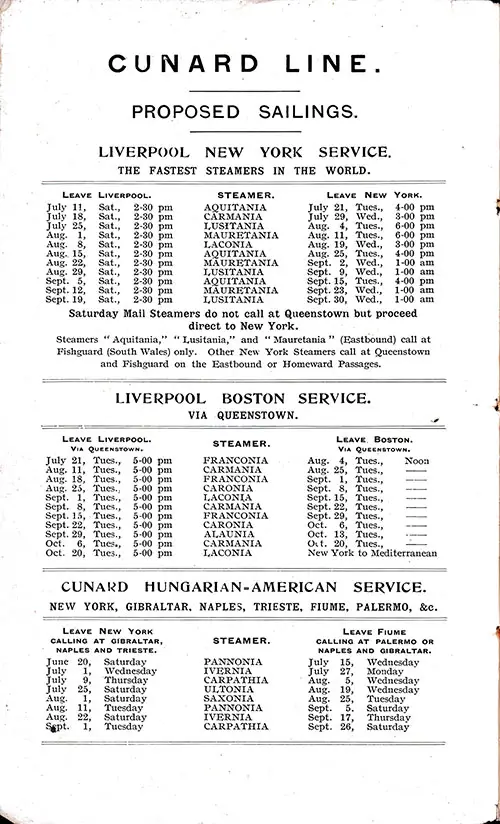
Sailing Schedule, Liverpool-New York, Liverpool-Boston, and Hungarian-American Services (New York-Gibraltar-Naples-Trieste and Fiume-Palermo or Naples-Gibraltar-New York), from 20 June 1914 to 29 October 1914. Ships Included the Alaunia, Aquitania, Carmania, Carpathia, Franconia, Ivernia, Laconia, Lusitania, Mauretania, Pannonia, Saxonia, and Ultonia. RMS Aquitania Second Cabin Passenger List, 11 July 1914. | GGA Image ID # 2307a5bb15
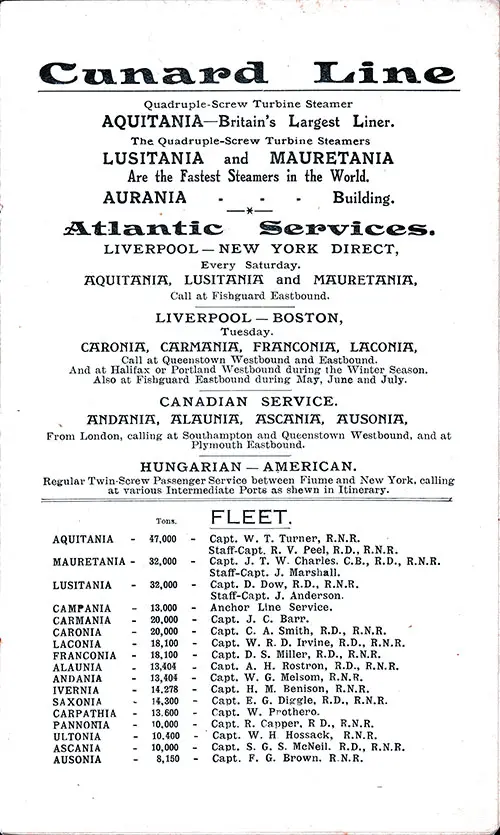
Cunard Line Atlantic Services and Fleet List. RMS Aquitania Second Cabin Passenger List, 11 July 1914. | GGA Image ID # 2307f1db39
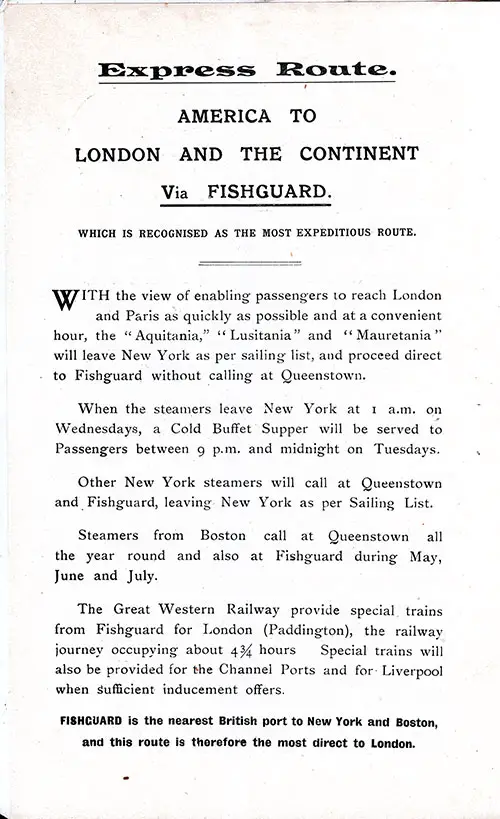
Express Route America to London and the Continent via Fishguard. RMS Aquitania Second Cabin Passenger List, 11 July 1914. | GGA Image ID # 230843670e
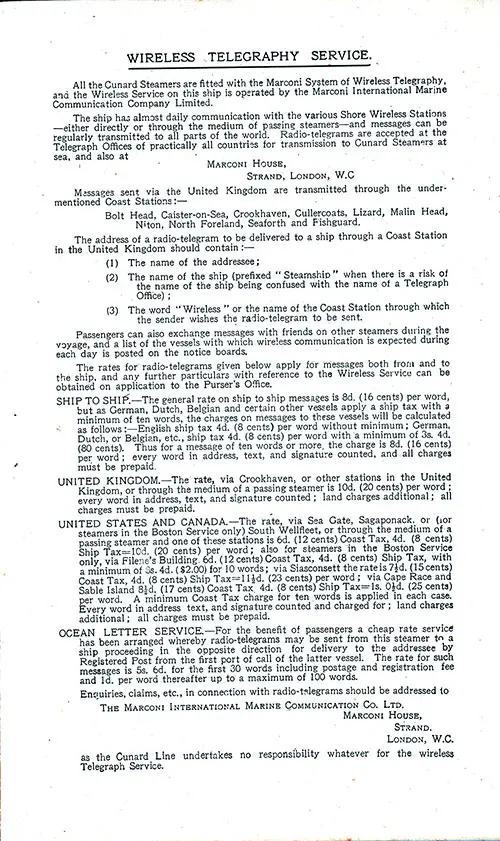
Wireless Telgraphy Services and Ocean Letter Service. RMS Aquitania Second Cabin Passenger List, 11 July 1914. | GGA Image ID # 2308ab5434
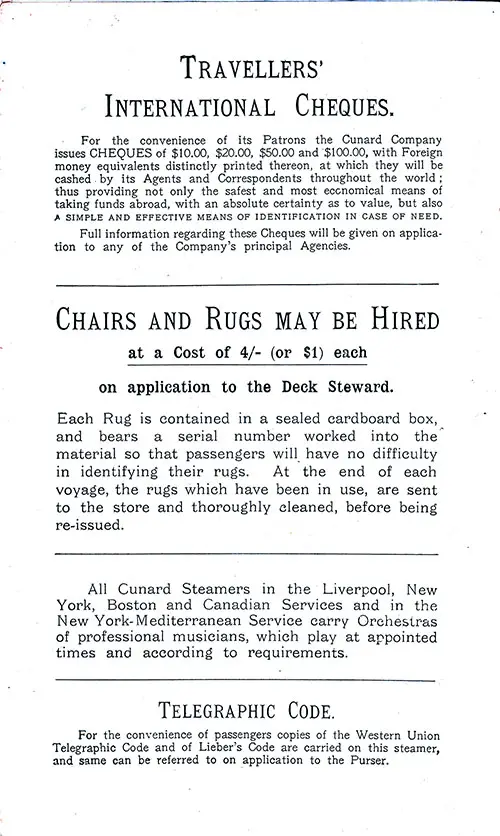
Travellers' International Cheques, Chairs and Rugs, Orchestras of Professional Musicians, and Telgraphic Code. RMS Aquitania Second Cabin Passenger List, 11 July 1914. | GGA Image ID # 2308b2b746
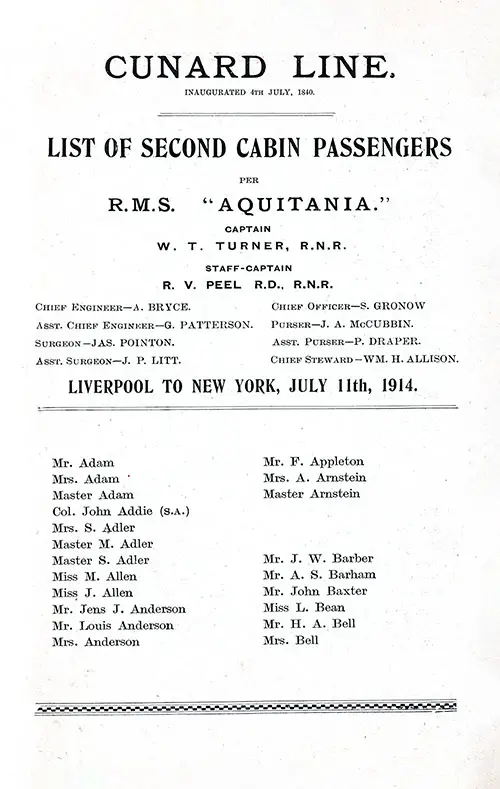
Title Page, Listing of Senior Officers and Staff, List of Passengers, Part 1 (Mr. Adam-Mrs. Bell). RMS Aquitania Second Cabin Passenger List, 11 July 1914. | GGA Image ID # 2308f49011
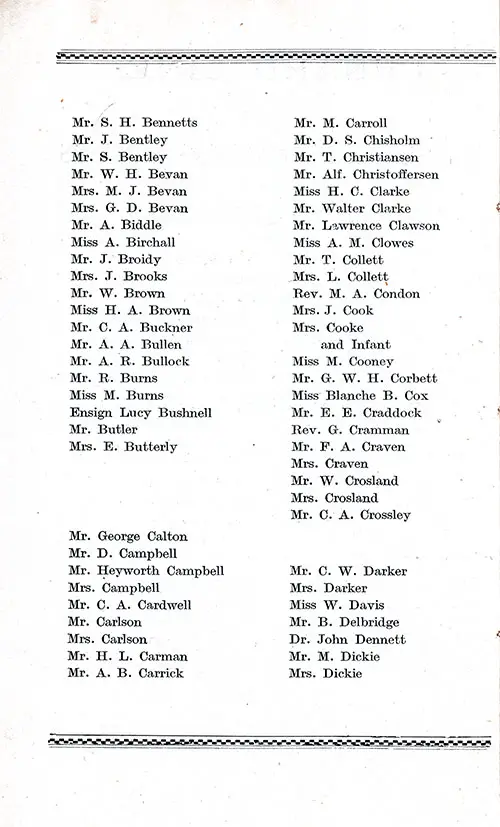
List of Passengers, Part 2 (Mr. S. . Bennetts-Mrs. Dickie). RMS Aquitania Second Cabin Passenger List, 11 July 1914. | GGA Image ID # 2309187420
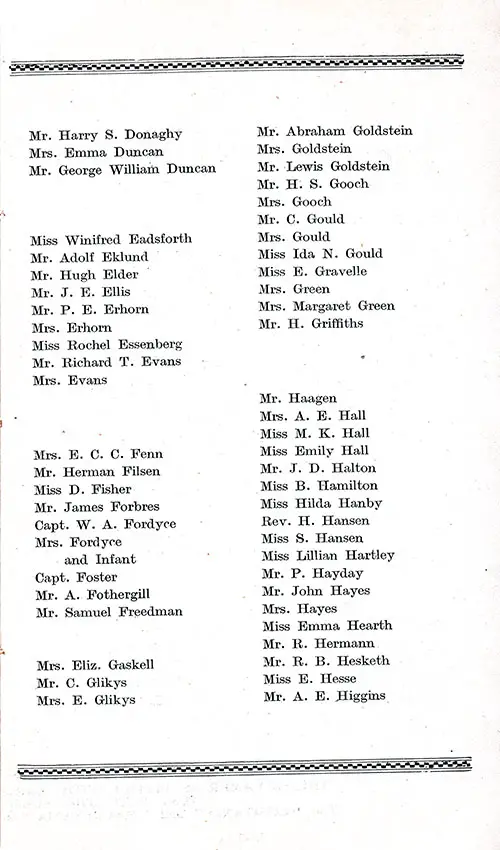
List of Passengers, Part 3 (Mr. Harry S. Donaghy-Mr. A. E. Higgins). RMS Aquitania Second Cabin Passenger List, 11 July 1914. | GGA Image ID # 230927d6fe
List of Passengers, Parts 4 and 5 (Mr. J. Hirschler-Mr. Chas. A. Nesbitt). Notice at Bottom of Page: This Steamer Is Fitted With Marconi’s System of Wireless Telegraphy. Also With the Submarine Signalling Apparatus. the “Lusitania” and “Mauretania” Are the Fastest Steamers in the World. RMS Aquitania Second Cabin Passenger List, 11 July 1914. | GGA Image ID # 23094a3bd6. Click to View a Larger Image.
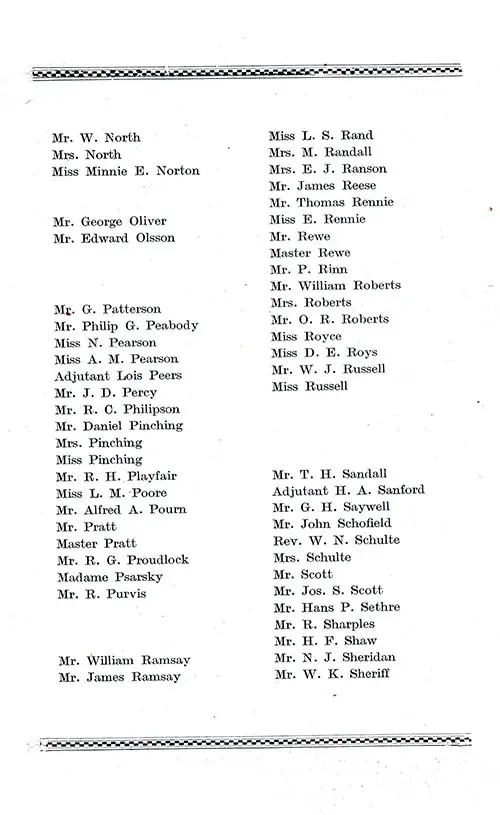
List of Passengers, Part 6 (Mr. W. North-Mr. W. K. Sheriff). RMS Aquitania Second Cabin Passenger List, 11 July 1914. | GGA Image ID # 23095f0215
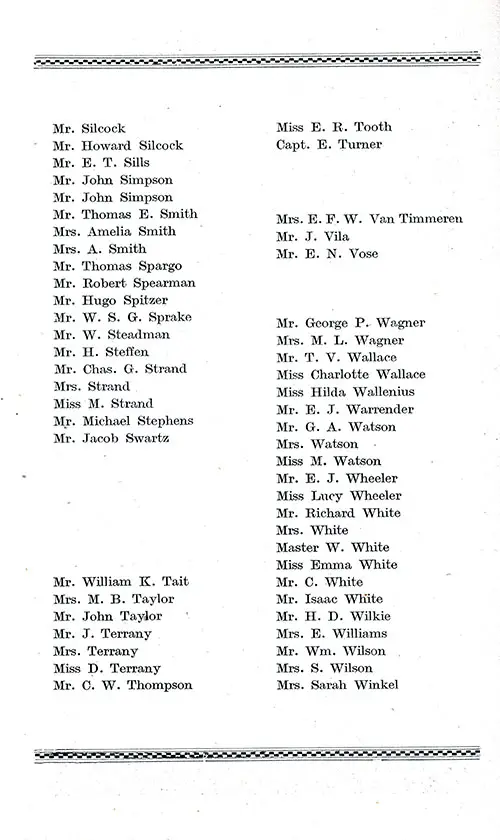
List of Passengers, Part 7 (Mr. Silcock-Mrs. Sarah Winkel). RMS Aquitania Second Cabin Passenger List, 11 July 1914. | GGA Image ID # 230977f02e
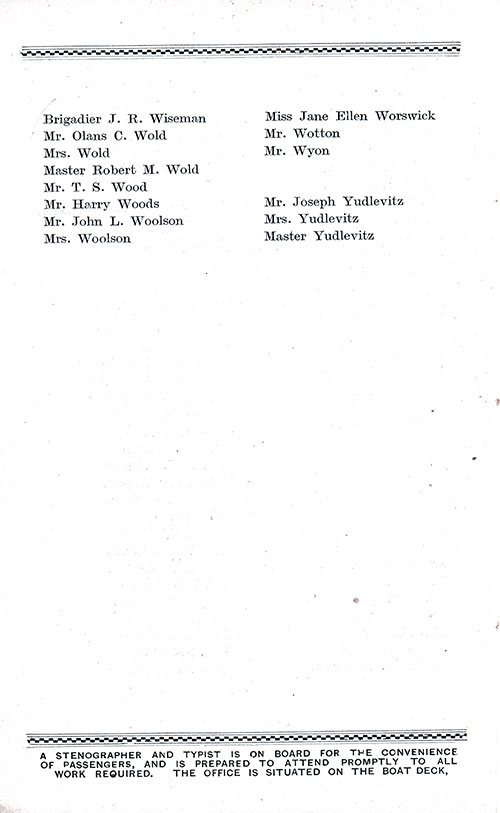
List of Passengers, Part 8 (Brigadier J. R. Wiseman-Master Yudlevitz). A Stenographer and Typist Is on Board for the Convenience of Passengers, and Is Prepared to Attend Promptly to All Work Required. The Office Is Situated on the Boat Deck. RMS Aquitania Second Cabin Passenger List, 11 July 1914. | GGA Image ID # 23097f28bf
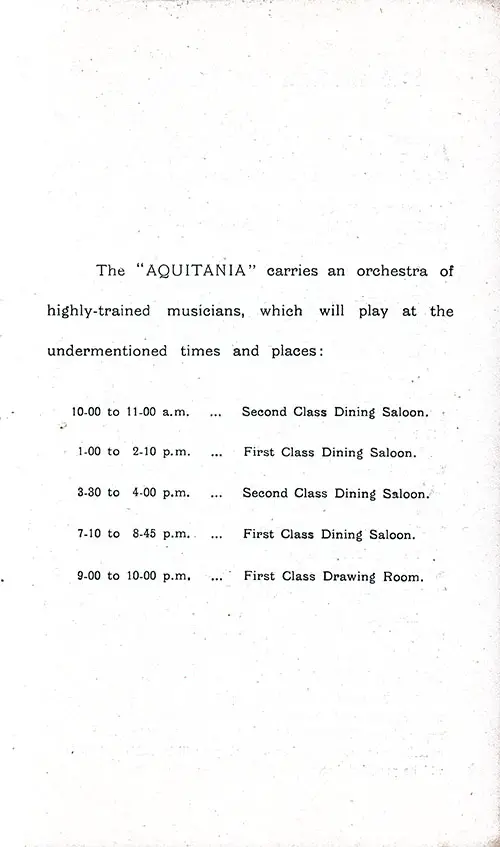
Aquitania Orchestra Schedule. RMS Aquitania Second Cabin Passenger List, 11 July 1914. | GGA Image ID # 2309ac83e5
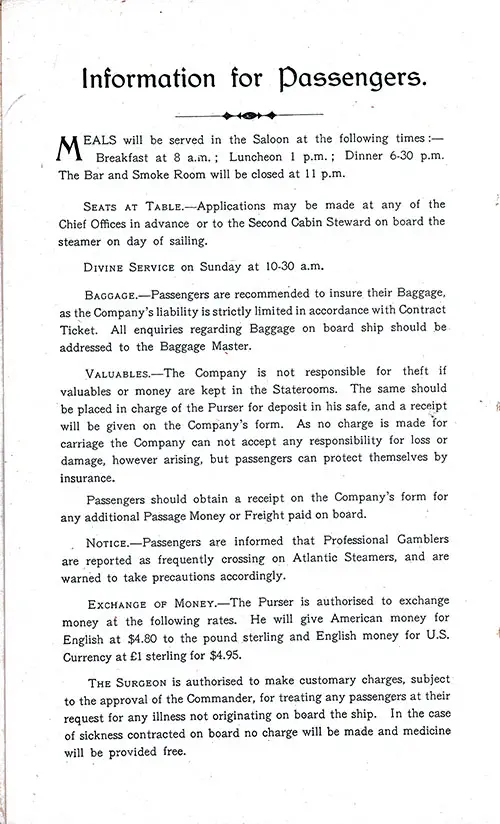
Information for Passengers, Part 1 (Meals, Seats at Table, Divine Service, Valuables, Professional Gamblers Notice, Exchange of Money, and The Surgeon). RMS Aquitania Second Cabin Passenger List, 11 July 1914. | GGA Image ID # 230a07773e
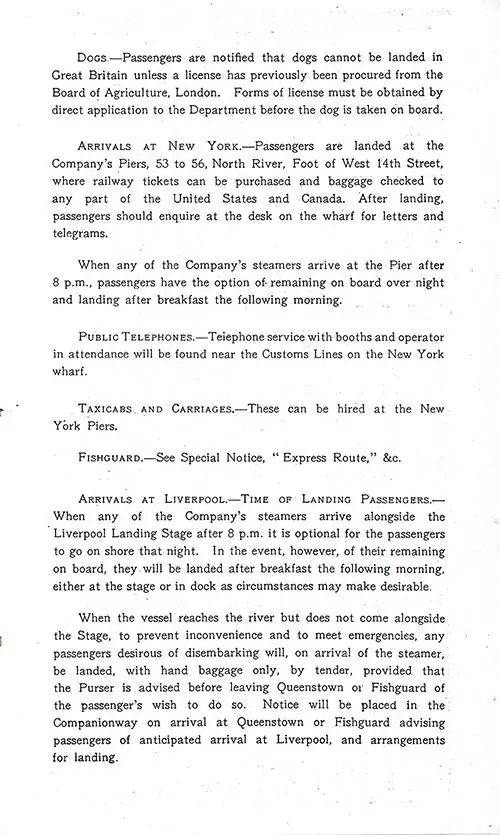
Information for Passengers, Part 2 (Dogs, Arrivals at New York, Public Telephones, Taxicabs and Carriages, Fishguard, and Arrivals at Liverpool). RMS Aquitania Second Cabin Passenger List, 11 July 1914. | GGA Image ID # 230a1a4f48
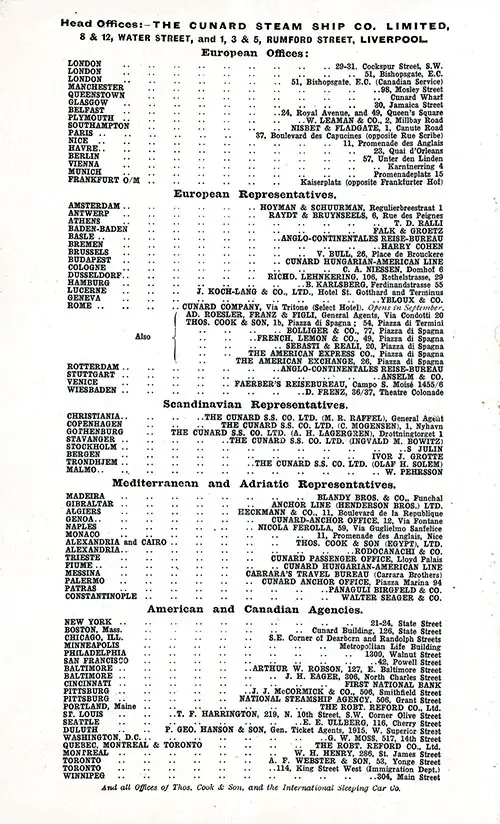
Cunard Offices and Agencies. RMS Aquitania Second Cabin Passenger List, 11 July 1914. | GGA Image ID # 230a78c0f8
Oversized Full-Color Map of Cunard Line New Express Route - New York to London and Continent (Direct) via Fishguard. RMS Aquitania Second Cabin Passenger List, 11 July 1914. | GGA Image ID # 230ae165b2. Click to View a Larger Image.
The Start of the European Conflict that Became WW1
- On 4 August 1914, President Woodrow Wilson proclaimed a policy of neutrality regarding the conflict in Europe.
- On 5 August 1914, the Senate and House of Representatives passed House Joint Resolution 314 for the relief, protection, and transportation of American citizens in Europe away from the emerging conflict. This resolution, which was a significant step in the U.S. response to the war, authorized the armed forces to deliver gold abroad, empowering the president to employ officers, employees, and vessels of the United States and use any supplies of the naval or military establishments, and to charter and employ any ships that may be required with an appropriation not to exceed $2.5 million.
- On 6 August 1914 At 10:20 p.m., the armored cruiser Tennessee (CA-10) sails from New York Harbor for Falmouth, England, carrying $3 million in gold from private banking interests and $1.5 million in gold coin from a Congressional appropriation to provide financial relief to Americans caught up in the outbreak of World War I. Aboard the Tennessee are a delegation of Army officers, additional Navy and Marine Corps officers, five bankers, representatives of the banking interests sending private funds, five representatives of the Treasury Department, a State Department diplomatic advisor, the national director of the American Red Cross and his secretary, and eight War Department clerks and a messenger. Under the auspices of the United States Relief Commission in Europe, an organization established to coordinate and facilitate relief efforts, the funds are intended to shore up the collapsed European credit system to enable the 125,000 Americans and their interests stranded abroad to return home.
- On 7 August 1914, Armored cruiser North Carolina (CA-12) and collier Vulcan (AC-5) set sail from the Boston Navy Yard, their destination a rendezvous off Cape Cod with the armored cruiser Tennessee (CA-10) bound for Falmouth, England. This coordinated movement was a testament to the strategic planning involved in the relief efforts.
- On 15 August 1914, U.S. Ambassador to the Ottoman Empire Henry Morgenthau urgently wires Secretary of State William J. Bryan about receiving requests from U.S. interests in the Ottoman cities of Beirut and Smyrna (modern day Izmir) demanding immediate action-U.S. warships be sent to protect American lives and property.
- 16 August 1914, Armored cruiser Tennessee (CA-10) arrives in Falmouth, England, at 7:45 p.m. The following day, $400,000 in gold is sent to London through a secure and coordinated process, with $300,000 consigned to U.S. Ambassador to Great Britain Walter Hines Page, who was responsible for overseeing the distribution of the funds, with the other $100,000 provided to two U.S. Army officers for relief work.
- On 18–19 August 1914, Armored cruiser North Carolina (CA-12) sails from Falmouth, England, and arrives in Cherbourg, France, the following day carrying $200,000 in gold and additional American officials for the U.S. Relief Commission in Europe.
- On 20 August 1914, Armored cruiser Tennessee (CA-10) sails from Falmouth, England, for the Hook of Holland.
📜 Research note: Some names and captions were typed from originals and may reflect period spellings or minor typographical variations. When searching, try alternate spellings and cross-check with related records. ⚓
Curator’s Note
For over 25 years, I've been dedicated to a unique mission: tracking down, curating, preserving, scanning, and transcribing historical materials. These materials, carefully researched, organized, and enriched with context, live on here at the GG Archives. Each passenger list isn't just posted — it's a testament to our commitment to helping you see the people and stories behind the names.
It hasn't always been easy. In the early years, I wasn't sure the site would survive, and I often paid the hosting bills out of my own pocket. But I never built this site for the money — I built it because I love history and believe it's worth preserving. It's a labor of love that I've dedicated myself to, and I'm committed to keeping it going.
If you've found something here that helped your research, sparked a family story, or just made you smile, I'd love to hear about it. Your experiences and stories are the real reward for me. And if you'd like to help keep this labor of love going, there's a "Contribute to the Website" link tucked away on our About page.
📜 History is worth keeping. Thanks for visiting and keeping it alive with me.

